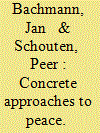|
|
|
Sort Order |
|
|
|
Items / Page
|
|
|
|
|
|
|
| Srl | Item |
| 1 |
ID:
158715


|
|
|
|
|
| Summary/Abstract |
Do roads literally lead to peace? While seemingly a strange question to ask, today's peacebuilders certainly seem to think so. After decades of focus on questions of governance, today, instead, infrastructure primes in state- and peacebuilding missions in many fragile and conflict-affected societies. Peacebuilding efforts in places ranging from Somalia to Afghanistan to the Congo are, to a considerable extent, interventions in the built environment. While infrastructure has always been around in post-conflict reconstruction, today, infrastructure is mobilized during ongoing conflict, invested with aspirations of improving security and stability. To be sure, infrastructure played a big role in the formation of strong western states. But can we take this experience to try and forge political orders of concrete and steel? At a first glance, a theory of change that reorders societies by deploying the hidden powers of the built environment seems compelling, and measurable and concrete infrastructure outputs, additionally, fit perfectly within today's more pragmatic approaches to peace. However, based on examples from across the contemporary global peacebuilding landscape, we show that infrastructure neither amounts to a uniform force, nor is it clear what its impact on peace exactly is. What is certain is that infrastructure is profoundly entwined with contemporary peacebuilding, and that we therefore need to develop novel theoretical angles to come to terms with the ubiquitous politics of infrastructure.
|
|
|
|
|
|
|
|
|
|
|
|
|
|
|
|
| 2 |
ID:
099053


|
|
|
|
|
| Publication |
2010.
|
| Summary/Abstract |
The recent establishment of the US Africa Command (AFRICOM) embodies the resurgence of counterinsurgency arguments within the transformation of the US military. The command's emphasis on its "non-traditional" character that includes civil activities, a focus on the population's security, as well as its interagency approach intensified the controversy about the role of the military in US foreign policy. Rather than merely focusing on how to succeed in asymmetric warfare, AFRICOM proposes a long-term commitment of US forces in situations where violent conflict is not apparent and has to be prevented. This "proactive peacetime engagement" on the continent targets crucial communities and their perceptions through humanitarian and development projects. Africa is likely to become a testing ground for the US military's expansion into "non-traditional" activities ranging from counterinsurgency to conflict prevention. Blending security and development in this radical way may make the distinction between civil and military intervention vanish.
|
|
|
|
|
|
|
|
|
|
|
|
|
|
|
|
| 3 |
ID:
093883


|
|
|
|
|
| Publication |
2010.
|
| Summary/Abstract |
This article analyses the merging of development and security in Western policies vis-à-vis 'deficient' states in the Global South, looking at the social life of anti-terror policies in Kenya. The attacks on 11 September 2001 renewed the interest in strong and stable states, leading many donors to focus on capacity building and security sector reform. In Kenya, the repressive use of these new powers by the Kibaki government has created significant resistance and the main external actors have taken the local opposition into account and have adapted their anti-terror agendas. They have complemented hard security assistance with soft interventions aimed at addressing local issues such as conflict prevention and development in communities perceived as being 'at risk' of harbouring terrorists. Representing a more general shift in security interventions in Africa, countering terrorism is now presented as part of a broader 'peace and security' agenda, but despite using new methods to engage with so-called crucial parts of the population, this repositioning is not a paradigm shift. Despite the different approaches and objectives, the various projects have ambiguous effects and donors have not abandoned the traditional rationality, which privileges homeland protection over civil rights in the recipient country
|
|
|
|
|
|
|
|
|
|
|
|
|
|
|
|
| 4 |
ID:
131249


|
|
|
|
|
| Publication |
2014.
|
| Summary/Abstract |
Current Western security doctrines assert that state fragility, radicalization and humanitarian disasters in the global South feed into 'persistent conflict'. Such a scenario consequently requires a closely coordinated and integrated response from political and military actors. In this context, Western governments have introduced the concept of stabilization in their approaches to 'fragile' states. This article aims to understand the expanding activities of the US military in sub-Saharan Africa, which are conducted under the label of stability operations. It will be argued that the vast spectrum of activities under this label - from health projects to drone attacks - can be made comprehensible through the concept of policing, understood as processes of regulating communities with the aim of establishing 'good order'. Key pillars of the US military's stability operations operations doctrine - namely, a focus on the welfare of the population (on a par with the minimum use of force) as well as an extended preventative engagement - overlap with concerns of police power. Presented by security strategists as vulnerable to instability, sub-Saharan Africa has become an experimental ground for the US military, where ideas on stability operations are tested. Empirically, the article discusses two manifestations of stability operations that warrant an analysis through the concept of policing: US Africa Command's (AFRICOM) civil affairs projects and the US military's active involvement in ongoing conflicts.
|
|
|
|
|
|
|
|
|
|
|
|
|
|
|
|
|
|
|
|
|